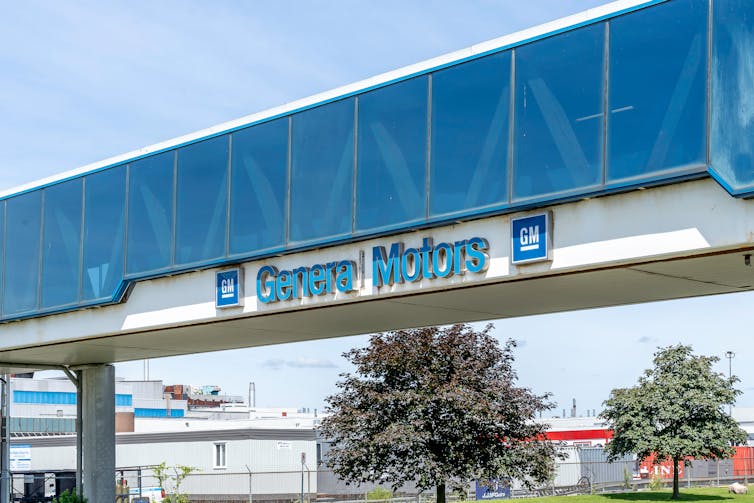US inflation has increased since Trump took office – why prices are unlikely to come down soon
- Written by Conor O'Kane, Senior Lecturer in Economics, Bournemouth University

The cost of living crisis, which saw inflation in the US peak at a four-decade high[1] of 9.1% in 2022, played a significant role in determining the outcome of last November’s presidential election.
Exit polls across ten of the key battleground states showed 32% of voters[2] considered the economy to be the most important election issue. Among that group of voters, a staggering 81% voted for Donald Trump.
Trump had spent most of his election campaign saying his administration would tackle high prices – even vowing to bring them down on day one[3]. However, the latest figures suggest inflation in the US has increased since he took office, rising unexpectedly[4] to a six-month high of 3% in January.
This rise is largely because of the economy Trump inherited. But some experts have expressed concerns[5] that his stated economic strategy, including trade tariffs, major tax cuts and lower interest rates, will only add to inflation.
While tax cuts and interest rate changes are familiar policies, the use of tariffs has been less common in recent decades. These are used by governments to balance trade relationships or in retaliation to tariffs imposed by other countries. They generally make foreign imported goods more expensive while also raising tax revenues for governments.
The Trump administration has set tariffs of 25% on all steel and aluminium imports[6], and imposed 10% trade tariffs on a wide range of consumer imports from China. While proposed tariffs of 25% on imports from Mexico and Canada have been temporarily paused[7], the US has signalled its intention[8] to introduce tariffs on imports from the European Union.
Trump’s aides insist the tariffs won’t have a negative impact on American consumers and businesses. On February 18, Peter Navarro, senior counsel for trade and manufacturing at the White House, told the New York Times[10]: “It’s not going to be painful for America. It’s going to be a beautiful thing.”
Navarro argues that foreign exporters, concerned about losing market share, will reduce the pre-tariff price they charge US importers.
But economic theory suggests that tariffs generally do lead to higher prices. Peter Lavelle, a trade expert at the UK’s Institute for Fiscal Studies, says that evidence[11] from Trump’s first term – when tariffs were imposed on solar panels, washing machines, steel and aluminium – shows these costs were “almost entirely passed on to domestic consumers”, thus adding to inflation.
A key reason for the tariffs is to make US domestic manufacturing more competitive on the international stage. This could bring manufacturing jobs back to the US. Manufacturing employment declined by 35%[12] in the US from its peak of 19.6 million in 1979 to 12.8 million in 2020.
However, there was no evidence of tariffs bringing manufacturing jobs back to the US during Trump’s first term. In fact, manufacturing employment remained static[13] between 2017 and 2021.
There are fears that tariffs could instead trigger a trade war, where countries retaliate with tariffs of their own. Canadian officials, for instance, have made it clear they will introduce retaliatory tariffs[14] on the US – “selected in order to hit particularly red and purple [Trump-supporting] states”.
Economists analyse such scenarios using game theory. A trade war takes the form of what economics-speak calls a “non-cooperating Nash equilibrium”, where the economic outcome is negative for all countries involved.
Some recent modelling on the impact of Trump’s proposed tariffs on Canada and Mexico supports this view[15]. Tariff retaliation is likely to raise inflation rates even further than otherwise in all three economies.
A trade war could also squeeze profit margins for exporting producers in the US, by making some US-produced goods relatively more expensive. This would show up in lower real income through reduced employment and wages. This outcome, like higher prices, is unlikely to be popular with US voters.
References
- ^ four-decade high (www.wsj.com)
- ^ 32% of voters (www.statista.com)
- ^ bring them down on day one (www.bbc.co.uk)
- ^ rising unexpectedly (www.bbc.co.uk)
- ^ have expressed concerns (www.bbc.co.uk)
- ^ steel and aluminium imports (theconversation.com)
- ^ temporarily paused (www.theguardian.com)
- ^ signalled its intention (www.bbc.co.uk)
- ^ JHVEPhoto / Shutterstock (www.shutterstock.com)
- ^ told the New York Times (www.nytimes.com)
- ^ says that evidence (ifs.org.uk)
- ^ declined by 35% (www.bls.gov)
- ^ remained static (data.bls.gov)
- ^ introduce retaliatory tariffs (www.nytimes.com)
- ^ supports this view (www.piie.com)
- ^ proposed tax cuts (www.bloomberg.com)
- ^ lower interest rates (www.reuters.com)
- ^ believes (www.nytimes.com)
- ^ been voted out (www.marketplace.org)







